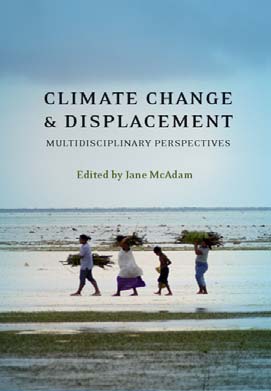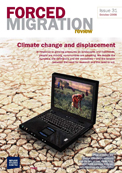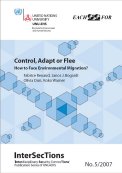 Jane McAdam has further added to the gap in climate change and migration literature with her newest opus Climate Change and Displacement: Multidisciplinary Perspectives.
Jane McAdam has further added to the gap in climate change and migration literature with her newest opus Climate Change and Displacement: Multidisciplinary Perspectives.
As her book summary outlines:
Environmental migration is not new. Nevertheless, the events and processes accompanying global climate change threaten to increase human movement both within States and across international borders. The Intergovernmental Panel on Climate Change has predicted an increased frequency and severity of climate events such as storms, cyclones and hurricanes, as well as longer-term sea level rise and desertification, which will impact upon people’s ability to survive in certain parts of the world.
This book brings together a variety of disciplinary perspectives on the phenomenon of climate-induced displacement. With chapters by leading scholars in their field, it collects in one place
a rigorous, holistic analysis of this phenomenon, which can better inform academic understanding and policy development alike. Governments have not been prepared to take a leading role in developing responses to the issue, in large part due to the absence of strong theoretical frameworks from which sound policy can be developed. The specialist expertise of the authors in this book means that each chapter identifies key issues that need to be considered in shaping domestic, regional and international responses, including the complex causes of movement, the conceptualisation of migration responses to climate change, the terminology that should be used to describe those who move, and attitudes to migration that may affect decisions to stay or leave. The book will help to facilitate the creation of principled, research-based responses, and establish climate-induced displacement as an important aspect of both the climate change and global migration debates.
She includes chapters by familiar and influential migration, human rights, environmental, and legal scholars:
- “Climate Change-Induced Mobility and the Existing Migration Regime in Asia and the Pacific” by Graeme Hugo
- “Migration as Adaptation: Opportunities and Limits” by Jon Barnett and Michael Webber
- “Climate-Induced Community Relocation in the Pacific: The Meaning and Importance of Land” by John Campbell
- “Conceptualising Climate-Induced Displacement” by Walter Kälin
- “‘Disappearing States’, Statelessness and the Boundaries of International Law” by Jane McAdam
- “Protecting People Displaced by Climate Change: Some Conceptual Challenges” by Roger Zetter
- “International Ethical Responsibilities to ‘Climate Change Refugees'” by Peter Penz
- “Climate Migration and Climate Migrants: What Threat, Whose Security?” by Lorraine Elliott
- “Climate-Related Displacement: Health Risks and Responses” by Anthony J McMichael, Celia E McMichael, Helen L Berry and Kathryn Bowen
- “Climate Change, Human Movement and the Promotion of Mental Health: What have we Learnt from Earlier Global Stressors?” by Maryanne Loughry
- “Afterword: What Now? Climate-Induced Displacement after Copenhagen” by Stephen Castles
We have yet to read the book, but it seems set to be an
essential part of any climate change and migration reader’s diet.




great representation from my alma mater UNSW!